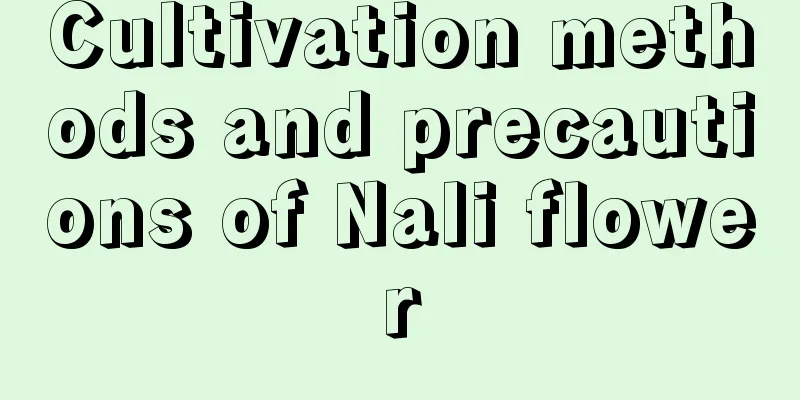Cultivation methods and precautions of Nali flower

How to grow Nali flowersPot soil selectionWhen growing Nari flowers, you can choose a flowerpot according to your needs. You can grow one bulb in a pot, and you can choose a smaller pot, or you can grow 3-4 bulbs in a pot, and choose a larger pot. When potting, choose soil with good drainage. You can mix peat soil, garden soil and perlite, and add a small amount of base fertilizer to prepare the soil. Light and temperatureNali flower likes warm and sunny environment. It has a certain degree of cold resistance, but is not resistant to high temperatures. Ensure that the Nali flower has a certain amount of light during its growth period. It can be placed in a semi-shaded place in spring and autumn. Avoid direct sunlight in summer and pay attention to shading. The maximum growth temperature should not exceed 30℃. It can withstand low temperatures, and the low temperatures in winter will not affect the growth of Nali flowers. Watering and fertilizingNali flower is not tolerant to water and humidity during its growth period and requires certain nutrients. A certain amount of base fertilizer needs to be applied when planting, and water should be poured once after potting. In spring and autumn, the potting soil needs to be kept moist, and liquid fertilizer should be applied once every half a month. In summer, which is a dormant period, you should water less. In winter, you need to control watering and stop fertilizing. Reproduction methodThe most common way to propagate Nali flower is by bulb division, but it can also be propagated by sowing or tissue culture. Things to note when growing Nali flowersPests and diseasesDuring the cultivation process of Nali flower, common diseases are soft rot and charcoal blast, and common pests are cutworm, white grub and thrips, which can cause great harm to the plants. RepottingFor potted Nari flowers, you need to care for them for a period of time after potting them before repotting or changing the soil, but it is not necessary to repot them every year. |
<<: Holly cultivation methods and precautions
>>: The cultivation methods and precautions of Allium macrocarpon
Recommend
Does the lucky tree like the sun or the shade? Plants like sunlight (maintain in a sunny place)
Does the lucky tree prefer shade or sun? The luck...
Cyclamen flower stems wilt and bend down
1. Reasons for bending down 1. Excessive watering...
Gardenia's flowering period and why it doesn't bloom
1. When is the flowering period? It usually bloom...
Methods and precautions for propagation of wolfberry by cuttings
Wolfberry cutting time Wolfberry is generally pro...
Can green pepper seeds be planted?
Can green pepper seeds be planted? The seeds of g...
What to do if you overwater your succulents (Remedies for accidentally overwatering succulents)
Youhuayou asked: If I accidentally watered the su...
Is planting Dendrobium profitable? What are the costs and profits of planting?
Is planting Dendrobium profitable? There are many...
What are the cultivation methods and precautions of tiger orchid?
Tiger orchid cultivation method Tiger orchid belo...
When is the best time to water the plant? Generally, water it every few days.
Smooth sailing watering time The plant has a rela...
What to do if Podocarpus loses its leaves
reason Root rot The Pearl River Delta region has ...
Do one more thing, watering, and your flowers will grow 10 times faster than others
Drying Flowers cannot be watered directly with ta...
Methods for controlling water in large cymbidium pots
The advantages of using large pots to bury and co...
Cultivation methods and precautions of jasmine
Pencil tip jasmine is very easy to grow and has a...
Sugarcane farming method
1. Maintenance methods 1. Substrate selection: In...
What is the best soil for plum blossom potting? What are the precautions for plum blossom potting?
1. Soil selection Plum blossoms are southern flow...









